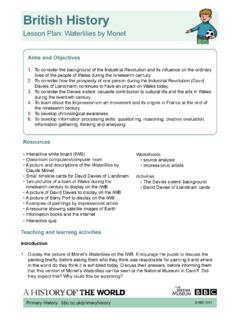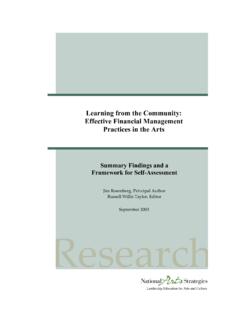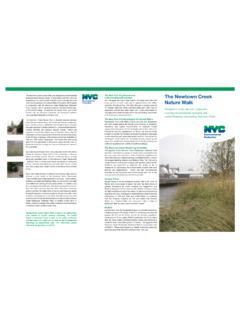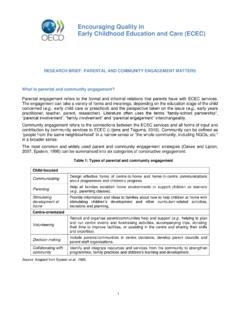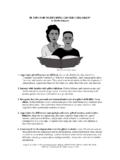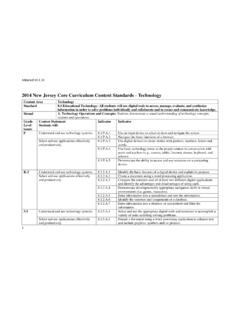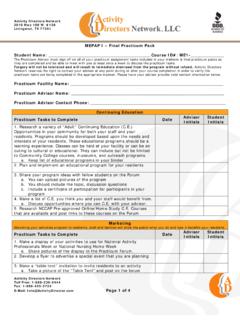Transcription of Why is Archaeology Important?
1 Archaeology plays a real and vital role in today sworld, although its valuable lessons and benefitscan seem removed from everyday life. This articleexamines how understanding and conservingarchaeological resources enhances the present andthe future. This discussion of the importance ofarchaeology and archaeological resources pairs wellwith the previous article, which outlines the com-plexities of archaeological research. We have, how-ever, separated the two topics to better highlightboth of them. We hope this article imparts anawareness of the importance and fragility ofGeorgia s archaeological Archaeology s ImportanceThe preceding article describes goals of archae-ology.
2 It concludes that archaeologists seek to under-stand human behavior from the micro ( , mak-ing a stone tool) to the macro ( , the spice tradebetween Europe and Asia). In this paper, we askwhy and how the study of the past has relevance fortoday s society. Also, we identify the contributionsarchaeology makes to modern life and to otheracademic most extensive programs that unite archae-ology and the modern world are so-called publicarchaeology projects. Public funds support archae-ological investigations in the early stages of proj-ects involving federal funds, licensing, permits, orlands.
3 For instance, when the US Forest Servicelets a logging contract, archaeologists visit theproperty first to ascertain what sites are there andhow significant they are. Archaeologists evaluatethe sites with a set of specific criteria laid out bylaw. If they determine a site is significant, it iseither excavated to recover the information it con-tains, or it is avoided and protected. This is calledcultural resource management, or CRM, archaeol-ogy. CRM projects produce most of the newarchaeological information recorded in Georgia,and have for years, but the lands examined byCRM projects are only a small part of the state(Williams 2000).
4 CRM exists because legislators and their con-stituents the public and its representatives thought archaeological preservation importantenough to include in US laws, and in governmen-tal budgets. Thus, the public has already realizedthe relevance of Archaeology and archaeologicaldata to people living in today s world and preparingfor tomorrow s world. In this paper, we try to makea strong case for the unique and important waysarchaeological knowledge contributes to andenhances our lives, on a scale ranging from theindividual to the community, and to our Intellectual Importance of ArchaeologyIf archaeologists are asked why their work isimportant, they are most likely to respond that it isfor the same reasons history is valued.
5 By knowingour human past, we appreciate who we are andwhere we came from. Accordingly, by studying thepast, all of us can use this knowledge to inform ourdecisions about the future. Reassuringly, there aresigns that the public shares that perspective aboutarchaeology, too. 27 Why is Archaeology Important? Global Perspectives, Local Concernsby Charlotte A. Smith and Jennifer Freer HarrisA recent poll commissioned by the Society forAmerican Archaeology (Ramos and Duganne 2000)asked members of the general public why theythought Archaeology was important. Overwhelm-ingly, they responded that understanding the mod-ern world was the foremost benefit and that welearn about the past in order to improve the also suggest that the field contributes signifi-cantly to international affairs and in shaping mod-ern values.
6 That is evidence of substantially moreinsight into the field than archaeologists hadbelieved also see intrinsic aesthetic, cul-tural, and spiritual reasons for humans interest intheir past. Curiosity, too, plays a role; it is a char-acteristic that is particularly human and responsi-ble for many of our greatest they often downplay the mystery orromance of excavation and discovery of the past forfear that it may send the wrong message about theirgoals, archaeologists appreciate that the captivat-ing allure of knowing ourselves and our place in theworld is the root of all transcends the limitations of writ-ten records, and can reveal detailed stories whenno documents exist.
7 The focus of history inAmerica has traditionally been on great civiliza-tions, great individuals, and events relevant toWestern civilization. Archaeology not only speaksof that elite few who lived dramatic lives and per-haps were interred in rich burials, but also tells thestories of ordinary people and their daily examination calls for both a sensi-tivity to great detail seeing evidence left in merecentimeters of stratified deposits in soil com-bined with a simultaneous ability to zoom far backin space and time to discern broad patterns ofhuman behavior. Archaeology is, in short, a disci-pline that reveals truths by observing and explor-ing evidence in ways others overlook.
8 Unlike writ-ten history, which is often tied to national bound-aries or particular groups and may carry inherentbiases, Archaeology is truly a universal field, span-ning the experience of all in EducationArchaeology s potential for fostering more intel-ligent, involved, global citizens is considerable. Inclassrooms, learning about Archaeology helps stu-dents develop various skills across many disci-plines, including critical thinking. Archaeologycan be readily included in a comprehensive cur-riculum for social science, history, mathematics,environmental studies, and art.
9 Archaeologytouches on the entire spectrum of human behaviorand so inspires a never-ending series of learn to appreciate history from differentframes of reference, developing a sensitivity toother people and diverse cultures. Archaeologicalfindings provide a framework for questions aboutstatistics, economics, politics, cultural geography,ecology, agricultural practices, and food procure-ment, to name just a few. What other disciplinecan pull together those far-reaching lessons andalso teach practical applications for a global posi-tioning system, the Cartesian coordinate system,28 Early Georgia volume 29, number 1 Archaeology and the Education of Global CitizensIn recent years, global education has become a standard element in many primary and secondary school pro-grams.
10 Archaeology is a vital piece of that curriculum. Phyllis Messenger and Walter Enloe (1991:161 162) dis-cuss specific ways archaeologists can bring the world, past and present, into the classroom, using the breadthand depth that Archaeology can permits intensive study of a single culture over time, removing the myth of an unchanging tra-ditional past. By understanding the goals of archaeological research, students discover that their actions caninfluence the future, and impact both environment and society. By removing the exotic quality of another cul-ture, and by emphasizing our human similarities and explaining our differences, teachers can instill in studentsa respect for other cultures and their breadth and nature of archaeological inquiry helps teachers move from lectures to hands-on use a wide-set of resources museums , local sites, universities, and archaeological societies that then become available to the student.


